Mumbicharity9
On this page, you find all documents, package deals, and flashcards offered by seller mumbicharity9.
- 20
- 0
- 0
Community
- Followers
- Following
20 items
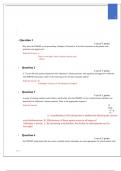
NURS 6630 Final Exam 3
1 Iout Iof I1 Ipoints Why Idoes Ithe IPMHNP Iavoid Iprescribing Iclozapine I(Clozaril) Ias Ia Ifirst-line Itreatment Ito Ithe Ipatient Iwith Ipsychosis Iand Iaggression? Selected IAnswer: A. I There Iis Itoo Ihigh Ia Irisk Iof Iserious Iadverse Iside I effects. • Question I2 1 Iout Iof I1 Ipoints A I75-year-old Imale Ipatient Idiagnosed Iwith IAlzheimer’s Idisease Ipresents Iwith Iagitation Iand Iaggressive I IThe IPMHNP Idetermines Iwhich Iof Ithe Ifoll...
- Exam (elaborations)
- • 17 pages •
1 Iout Iof I1 Ipoints Why Idoes Ithe IPMHNP Iavoid Iprescribing Iclozapine I(Clozaril) Ias Ia Ifirst-line Itreatment Ito Ithe Ipatient Iwith Ipsychosis Iand Iaggression? Selected IAnswer: A. I There Iis Itoo Ihigh Ia Irisk Iof Iserious Iadverse Iside I effects. • Question I2 1 Iout Iof I1 Ipoints A I75-year-old Imale Ipatient Idiagnosed Iwith IAlzheimer’s Idisease Ipresents Iwith Iagitation Iand Iaggressive I IThe IPMHNP Idetermines Iwhich Iof Ithe Ifoll...
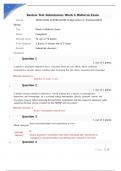
NURS 6630C – NURS 6630N Midterm Exam 7.
• Question II1 1 IIout IIof II1 IIpoints A IIpatient IIis IIprescribed IIfluoxetine IIbut IIis IIconcerned IIabout IIthe IIside IIeffects. IIWhich IIstatement IIdemonstrates IIaccurate IIpatient IIteaching IIwhen IIdiscussing IIthe IIside IIeffects IIassociated IIwith IIfluoxetine? Selected IIAnswer: C. II Induction IIof IImania IIis IIrare. • Question II2 1 IIout IIof II1 IIpoints A IIpatient IIrecently IItransferred IIfollowing IIa IIsui...
- Exam (elaborations)
- • 18 pages •
• Question II1 1 IIout IIof II1 IIpoints A IIpatient IIis IIprescribed IIfluoxetine IIbut IIis IIconcerned IIabout IIthe IIside IIeffects. IIWhich IIstatement IIdemonstrates IIaccurate IIpatient IIteaching IIwhen IIdiscussing IIthe IIside IIeffects IIassociated IIwith IIfluoxetine? Selected IIAnswer: C. II Induction IIof IImania IIis IIrare. • Question II2 1 IIout IIof II1 IIpoints A IIpatient IIrecently IItransferred IIfollowing IIa IIsui...
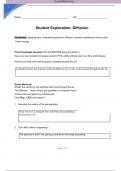
Copy of Diffusion GIZMO Exploration Guide
Click Play ( 2. Over time, what is happening? The particles X and Y are going up and down they keep fluctuating 2 This process, in which particles move from an area of high concentration (region A ) to an area of low concentration (region B ) , is called diffusion . 3. Select the BAR CHART tab, and observe the chart for a few minutes. After the first 30 seconds or so, how much do the numbers of particles in each region change...
- Exam (elaborations)
- • 9 pages •
Click Play ( 2. Over time, what is happening? The particles X and Y are going up and down they keep fluctuating 2 This process, in which particles move from an area of high concentration (region A ) to an area of low concentration (region B ) , is called diffusion . 3. Select the BAR CHART tab, and observe the chart for a few minutes. After the first 30 seconds or so, how much do the numbers of particles in each region change...
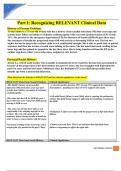
Heart_Failure-SKINNY_Reasoning
History of Present Problem: JoAnn Smith is a 72-year-old woman who has a history of myocardial infarction (MI) four years ago and systolic heart failure secondary to ischemic cardiomyopathy with a current ejection fraction (EF) of only 15%. She presents to the emergency department (ED) for shortness of breath (SOB) the past three days. Her shortness of breath has progressed from SOB with activity to becoming SOB at rest. The last two nights she had to sleep in her recliner chair to rest comf...
- Exam (elaborations)
- • 10 pages •
History of Present Problem: JoAnn Smith is a 72-year-old woman who has a history of myocardial infarction (MI) four years ago and systolic heart failure secondary to ischemic cardiomyopathy with a current ejection fraction (EF) of only 15%. She presents to the emergency department (ED) for shortness of breath (SOB) the past three days. Her shortness of breath has progressed from SOB with activity to becoming SOB at rest. The last two nights she had to sleep in her recliner chair to rest comf...
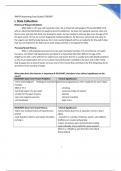
RAPID Reasoning Case Study-STUDENT
I. Data Collection History of Present Problem: Mike Kelly is a 51 year old Caucasian male. He is 6 feet tall and weighs 275 pounds (BMI 37.3) with an abnormal distribution of weight around his abdomen. He does not regularly exercise, does not like to cook, and eats fast food 3-5x during the week. He has smoked 1 pack per day since the age of 20 (31 pack years). He has no current diagnosed medical problems. He becomes concerned and came to the urgent care facility today because he is more eas...
- Exam (elaborations)
- • 13 pages •
I. Data Collection History of Present Problem: Mike Kelly is a 51 year old Caucasian male. He is 6 feet tall and weighs 275 pounds (BMI 37.3) with an abnormal distribution of weight around his abdomen. He does not regularly exercise, does not like to cook, and eats fast food 3-5x during the week. He has smoked 1 pack per day since the age of 20 (31 pack years). He has no current diagnosed medical problems. He becomes concerned and came to the urgent care facility today because he is more eas...
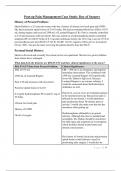
Postop Pain Management Case Study Day of Surgery
Post-op Pain Management Case Study: Day of Surgery History of Present Problem: Sheila Dalton is a 52-year-old woman who has a history of chronic low back pain and COPD. She had a posterior spinal fusion of L4-S1 today. She had an estimated blood loss (EBL) of 675 mL during surgery and received 2500 mL of Lactated Ringers (LR). Pain is currently controlled at 2/10 and increases with movement. She was started on a hydromorphone patient-controlled analgesia (PCA) with IV bolus of 0.1 mg and c...
- Exam (elaborations)
- • 14 pages •
Post-op Pain Management Case Study: Day of Surgery History of Present Problem: Sheila Dalton is a 52-year-old woman who has a history of chronic low back pain and COPD. She had a posterior spinal fusion of L4-S1 today. She had an estimated blood loss (EBL) of 675 mL during surgery and received 2500 mL of Lactated Ringers (LR). Pain is currently controlled at 2/10 and increases with movement. She was started on a hydromorphone patient-controlled analgesia (PCA) with IV bolus of 0.1 mg and c...
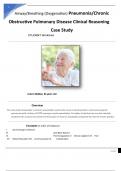
AirwayBreathing (Oxygenation) PneumoniaChronic
III. Acid-Base Balance IV. Thermoregulation V. Clinical Judgment VI. Pain VII. Patient Education VIII. Communication IX. Collaboration Pneumonia-COPD I. Data Collection History of Present Problem: JoAnn Walker is an 84-year-old female who has had a productive cough of green phlegm 4 days ago that continues to persist. She was started 3 days ago on prednisone 60 mg po daily and azithromycin (Zithromax) 250 mg po x5 days by her clinic physician. Though she has had intermittent ch...
- Exam (elaborations)
- • 14 pages •
III. Acid-Base Balance IV. Thermoregulation V. Clinical Judgment VI. Pain VII. Patient Education VIII. Communication IX. Collaboration Pneumonia-COPD I. Data Collection History of Present Problem: JoAnn Walker is an 84-year-old female who has had a productive cough of green phlegm 4 days ago that continues to persist. She was started 3 days ago on prednisone 60 mg po daily and azithromycin (Zithromax) 250 mg po x5 days by her clinic physician. Though she has had intermittent ch...

Heart Failure case study JoAnn Smith
1. What is the primary problem that your patient is most likely presenting with? The primary problem that my patient is most likely presenting with is congestive heart failure. 2. What is the underlying cause/pathophysiology of this primary problem? The underlying cause of this primary problem is her ejection fraction of 15% due to cardiomyopathy caused by an myocardial infarction and atrial fibrillation. Collaborative Care: Medical Management Care Provider Orders: Rationale: Tit...
- Exam (elaborations)
- • 21 pages •
1. What is the primary problem that your patient is most likely presenting with? The primary problem that my patient is most likely presenting with is congestive heart failure. 2. What is the underlying cause/pathophysiology of this primary problem? The underlying cause of this primary problem is her ejection fraction of 15% due to cardiomyopathy caused by an myocardial infarction and atrial fibrillation. Collaborative Care: Medical Management Care Provider Orders: Rationale: Tit...
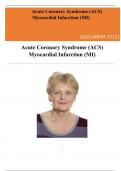
Acute Coronary Syndrome (ACS
Primary Concept Perfusion Interrelated Concepts (In order of emphasis) 1. Fluid and Electrolyte Balance 2. Clinical Judgment 3. Communication 4. Collaboration UNFOLDING Reasoning Case Study-STUDENT Acute Coronary Syndrome/Acute MI History of Present Problem: JoAnn Smith is a 68-year-old woman who presents to the emergency department (ED) after having three days of progressive weakness. She denies chest pain, but admits to shortness of breath (SOB) that in...
- Exam (elaborations)
- • 20 pages •
Primary Concept Perfusion Interrelated Concepts (In order of emphasis) 1. Fluid and Electrolyte Balance 2. Clinical Judgment 3. Communication 4. Collaboration UNFOLDING Reasoning Case Study-STUDENT Acute Coronary Syndrome/Acute MI History of Present Problem: JoAnn Smith is a 68-year-old woman who presents to the emergency department (ED) after having three days of progressive weakness. She denies chest pain, but admits to shortness of breath (SOB) that in...
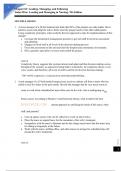
Test Bank for Leading and Managing in Nursing 7th Edition by Yoder Wise
1. A nurse manager of a 20-bed medical unit finds that 80% of the patients are older adults. She is asked to assess and adapt the unit to better meet the unique needs of the older adult patient. Using complexity principles, what would be the best approach to take for implementation of this change? a. Leverage the hierarchical management position to get unit staff involved in assessment and planning. b. Engage involved staff at all levels in the decision-making process. c. Focus the asse...
- Exam (elaborations)
- • 130 pages •
1. A nurse manager of a 20-bed medical unit finds that 80% of the patients are older adults. She is asked to assess and adapt the unit to better meet the unique needs of the older adult patient. Using complexity principles, what would be the best approach to take for implementation of this change? a. Leverage the hierarchical management position to get unit staff involved in assessment and planning. b. Engage involved staff at all levels in the decision-making process. c. Focus the asse...
